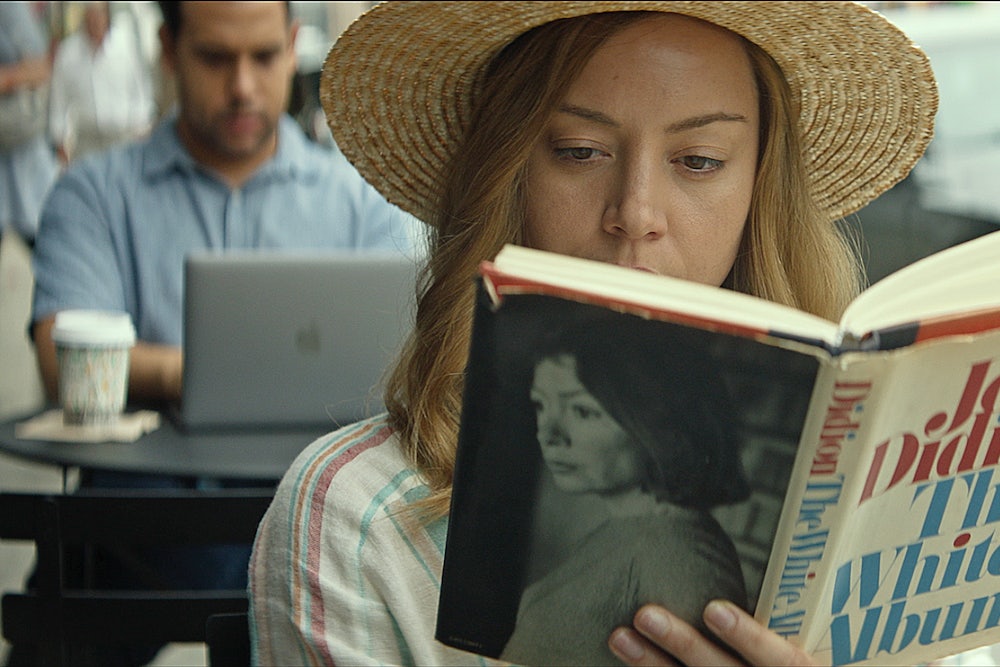The new Aubrey Plaza comedy Ingrid Goes West is about Instagram. The premise is fairly simple: Ingrid Thorburn (Plaza), onetime denizen of a psychiatric ward, becomes obsessed with pretty LA blonde Taylor Sloane (Elizabeth Olsen), an Instagram starlet. Ingrid manages to move to Venice Beach and to insinuate herself into Taylor’s life through a combination of stalking and strategic purchases (health foods, aspirational purses, hairdos). But the movie is not only about hating oneself and coveting other people’s selves, although Ingrid undoubtedly wishes she could chew and swallow every last piece of her IG crush’s life. It’s also a gleefully vicious critique of those coveted lives themselves.
Taylor Sloane is to-the-bone LA. She loves avocados and Joshua Tree, which she calls “J Tree.” Her hair is long and falls in loose white-lady waves. She wears white cotton and those ridiculous hats that only style bloggers and Williamsburg residents from 2009 sport. She fetishizes the craft traditions of the American Southwest, the kind sold for thousands of dollars in boutiques. Her home is filled with cacti and a large bearded man. She’s the film equivalent of an IG user like TheBalancedBlonde or any number of other banal wellness-peddlers.
In satirizing Taylor Sloane’s pretty, empty, commercial life, Ingrid Goes West points a finger at the proximity of silicon valley and venture capitalism to domestic aesthetics. Taylor calls herself “a photographer,” but she swaps IG posts for money from brands, which is not the same thing. Her husband, the bearded Ezra, hates her social media practice but the movie strongly implies that he resents her power and success more than he actually wishes for a more authentic life. He makes terrible art superimposing phrases like SQUAD GOALS over paintings of horses.
Instagram is owned by Facebook, and both companies trade in the currency of normal people’s images and information. In exchange for knowing everything about us and monetizing our friendships, Facebook builds a shadowy and superpowerful corporate empire that may well propel its founder into the White House one day. So, Ingrid Goes West portrays Taylor Sloane as a narcissistic and shallow young woman whose life is filled with low-grade human connections. But it also points out that “Instagram Influencer” is not a novel form. It’s that classic thing, the Sell Out.
As a youngish woman who uses social media, it is impossible for me to avoid “sponcon,” a genre of post in which users with a large enough following, or “influence,” are paid to post advertisements in their feeds. An Instagram user might post a picture of herself in a cute outfit by a particular fashion line, or pose in a bikini with a mug of laxative tea held next to her abs. On the one hand, there’s nothing very new about endorsement deals. Celebrities have always advertised products. I particularly love instances of outright contradiction, as when Naomi Campbell advertised Blackglama fur coats rather soon after posing for PETA’s “I’d rather go naked than wear fur” campaign.
But there’s something so abject about social media shills. A few weeks ago on Twitter, I came across this Macy’s ad for shorts. This lady, a YouTuber named Sierra Furtado, wears the shorts and poses in front of a bicycle. She seems perfectly nice, and I suppose it’s good that she doesn’t have to share her paycheck with an agent or any of the other traditional intermediaries in advertising. But the fact that she is the brand, not Macy’s, is totally bizarre. Her look is as flattened and generic as any ad on the side of a bus, but she somehow also has to maintain the illusion that this is her authentic life. The whole thing feels recursive and dizzying. I think the ad sucks and I don’t want the shorts.
These printed shorts from @Macys are everything - a summer must-have! #macyslove #sponsored https://t.co/NYPjovrJIp pic.twitter.com/DzsSNtRyd4
— Sierra Furtado (@sierra_furtado) June 30, 2017
I don’t want the shorts, because being Sierra Furtado seems depressing. Being Taylor Sloane in Ingrid Goes West seems depressing. Being anybody who takes money to show images to their hundreds of thousands of Instagram followers seems depressing. Your life consists of voluntary participation in an advertising economy that exists to make money and . . . what else? I can’t figure it out.
Every time I see somebody posing with some figs with a look on their face that suggests they are taking their power to influence people seriously, I’m so embarrassed I want to die. And I felt that embarrassment again in the cinema while watching Ingrid Goes West, because all its best jokes are either making fun of Taylor or over the burning, wretched shame of Ingrid.
The final twist in Ingrid Goes West’s plot elevates the movie from near-sappy morality tale about Learning to Love the Real You into very dark territory indeed. I won’t spoil the ending, but Ingrid learns that she can get attention in ways other than eating avocados and looking hot. The movie cries out for a sequel.
Plaza is an excellent comic actress, and as her blank-eyed and disingenuous foil, Elizabeth Olsen does just fine. Newcomer O’Shea Jackson Jr. (Straight Outta Compton) deserves praise as Plaza’s weed and Batman-obsessed love interest; his goofy charm supports Plaza’s deathstare sociopathy and prevents her having to carry the movie alone. The movie also contains some excellently precise jokes: Taylor just loves Joan Didion, so Ingrid does too. Late in the movie, we see Ingrid desperately plunging her toilet after using pages from The White Album as toilet paper. Ingrid Goes West is an excruciating cinema experience, because embarrassment is the name of the Instagram influencer game. Like all great movie comedies, it hurts, but it’s true.
